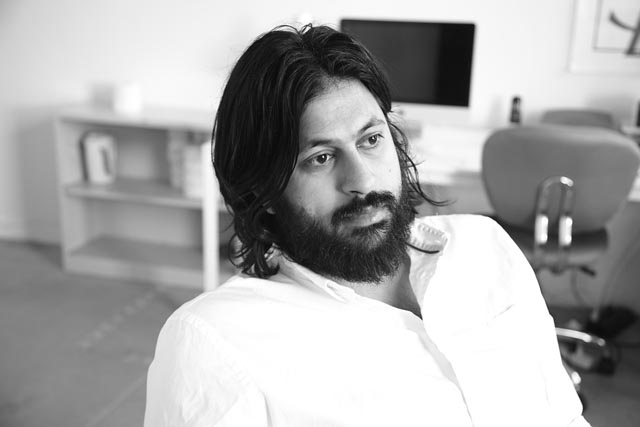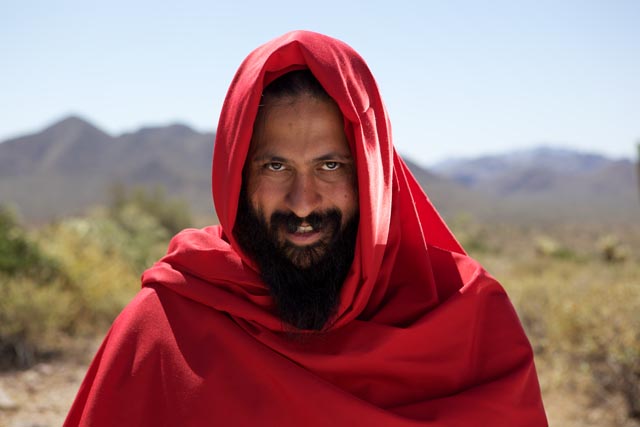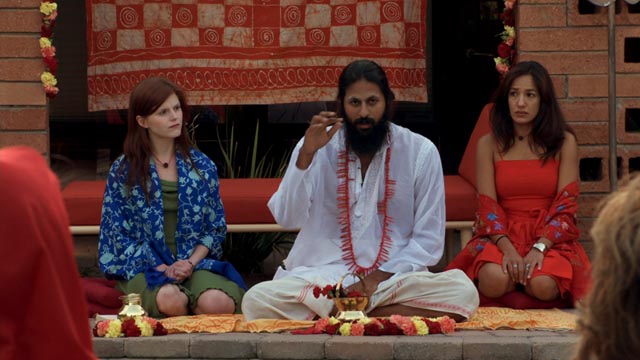
Vikram Gandhi – Looking for Answers in ‘Kumare’
In a very material world of designer haircuts and stylish togs, Vikram Gandhi, 33, did a radical thing: he grew his hair long and nurtured a massive beard. Forsaking all, he donned saffron robes, a fake accent and armed with a trident, became Kumare, the enlightened founder of the Sri Kumare spiritual movement.
Really?
Well, not really. Vikram Gandhi, you see, is a New York based-filmmaker and he is a fake guru in a real documentary, ‘Kumare’. Or as the film is billed, ‘The true story of a false prophet’. The film won the Audience Award for Best Documentary at 2011 SXSW Film Festival, premiered at NYIFF, and recently opened in New York to critical acclaim.
Vikram Gandhi, a self-proclaimed religious skeptic, set out to expose so-called holy men and show the futility of blind faith by transforming himself into a spiritual leader. The audacity of this act is quite breath-taking for he gave himself a detailed past history and a self-created spiritual philosophy to be shared with followers.
“Sri Kumaré is a revered Yoga Master, often known to his contemporaries as Adarsha or “The Mirror”, reads his biography. “He is the current torchbearer of the Kumaré lineage and a respected, charismatic teacher of Yogic Science. Sri Kumaré is known for his youthful energy, transformative philosophy, and divine blessing.”

In the garb of Kumare, Vikram Gandhi and two ‘disciples’ traveled to Phoenix, Arizona to a spiritual center where he is introduced as a wise man from the East and whose interactions with the community are to be filmed for a documentary. He soon gets himself an unsuspecting following of local Americans, troubled and looking for answers, and each is drawn to the ever-smiling, all-knowing, gentle Kumare who is a fount of wisdom.
Was it ethical to lead these needy people on? One has to wonder but the motivation was benign. The Kumare philosophy is ‘You don’t need any outside gurus, the ideal guru is within you’ and Kumare’s quest was to help the followers find their internal guru. As the lives of disciples and fake guru entwine, we see the consequences of the experiment, and both the deceiver and the deceived learn important truths about faith and the power of belief. In the end, Kumare has to ‘unveil’ himself as ‘Vikram Gandhi from New Jersey’ to his followers, and it is a surprising, moving finale.
So how did real and reel life juxtapose for Vikram Gandhi, who happens to be more familiar with the streets of Manhattan than with the caves of the Himalayas? Born in New York to Punjabi immigrant parents from Burma, he grew up around the tri-state area. His father, who worked at the Columbia Presbyterian Hospital in Harlem, had never lived in India yet the family’s Hindu roots were very strong.
In fact, his parents started an Arya Samaj Center in the basement of their home in Ridgewood, NJ, and so Vikram’s childhood was peppered with holy visitors, and he learned the Sandhya and hawan rituals as well as vedic hymns and Sanskrit as a way of maintaining culture. He went to summer camp at the Arsh Vidya Gurukulam Ashram in Pennsylvania, and also grew up with the epic tales of Amar Chitra Katha comics and the Mahabharata TV serials. Religion was all around him.
” I was a mischievous kid and I always questioned every single thing and every ritual because I was forced to do it without knowing why,” he says. “I thought the overly produced, elaborate words and ornaments around religion were quite silly.” The more holy men he encountered, the more analytic and questioning he became. With his interest in spiritual matters, it was natural for him to study religion in college.
Around this time, yoga was becoming a pop phenomenon in America and once again it awakened the skeptic in him. A graduate of Columbia University, he was now a freelance video journalist and had reported on political, economic and human rights issues for the Economist, Time, ABC and CNN. He decided to do a documentary expose on yoga gurus but this later transformed into ‘Kumare’ with himself, a non-actor, assuming the mantle of the spiritual leader.

Filmmakers often go back to their childhood to find the things which really matter to them; ‘Kumare’ developed out of all the people Vikram had encountered as a child – from his grandmother whose broken English and Indian accent he adopted, to the mannerisms of various swamis and pandits. He learned yoga and became a master at it. He created asanas and spiritual truisms which became Kumare-speak. Bit by bit, he put together the persona of Sri Kumare until he was a living, breathing guru whom the followers revered.
‘Kumare’ is almost a social experiment which Vikram likes to call ‘The Spiritual Placebo Effect.’ He asks: “Can a fake religion and religious leader have the same effect as a real one? If the facts are not real, does it make the experience any less real?”
He seems to be vindicated in that as most of the followers seemed to have gained from his ministrations and he himself feels the experience helped him to grow: “I just feel Kumare gave me a glimpse of how a different way of acting can change your outlook and also your interactions with everyone,” he says.
“Kumare was a kind of an idea that people wanted to believe in -and sometimes showing that side of yourself to people is a positive thing for everyone, including yourself. Kumare was the manifestation of my ideal self – the person I aspire to be – it’s good to have that person fresh in your mind, because there’s always room for improvement.”
One of the fun aspects of the marketing of ‘Kumare’ was that be it the after-parties or the sacred tattoos which were handed out, the wise Indian guru with his wild hair and smiling face was very much a part of it. Says the filmmaker: ” The marketing was a satire of real gurus – the indulgent presentation of a mystical person; we are playing of that because that is what real gurus do, so the film is a spoof of the way gurus market themselves. Religion and marketing are entwined and that’s what messes with our heads!”
Sri Kumare is now back to being Vikram Gandhi, back in his haunts of Brooklyn and Soho, working on his next, a feature narrative. Yet Kumare remains his alter-ego, his most perfect self. Have his experiences changed his skeptical views on religion? He says he’s more open-minded and less judgmental of what people believe, yet is wary of all the high-drama politics and ornaments of religion: ” We should just wake up and stop thinking there’s magic up there when our world is so messed up, and so many things we could solve if we weren’t so obsessed with vanity so much.”
Vikram Gandhi jokes about his own idealism: “Maybe when you grow up with a name like Gandhi, you want some social action to be attached to your spiritual leaders. It’s OK to dream a little bigger sometimes – because that is your name – and being idealistic doesn’t seem like something foolish; it seems like the only way to be.”
(C) Lavina Melwani
(This article first appeared in The Hindu )

1 Comment
Pingback: Big Announcement: David Wilcock’s Weekly TV Show! | Divine Cosmos